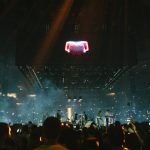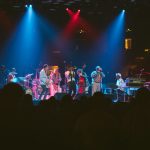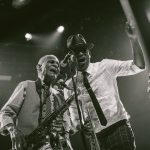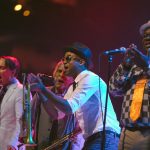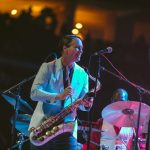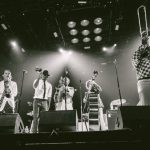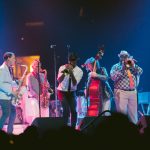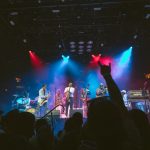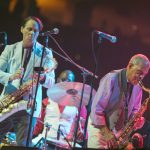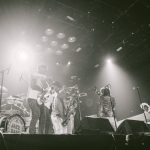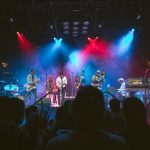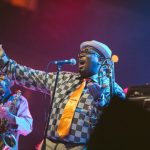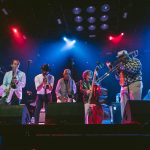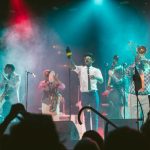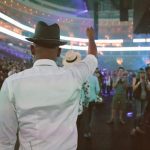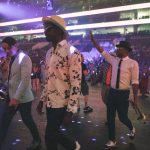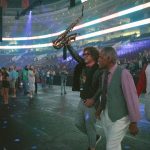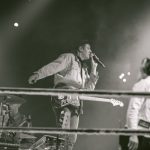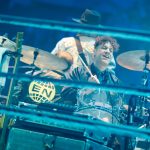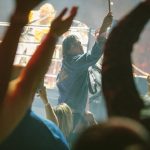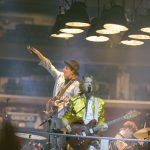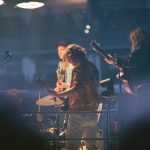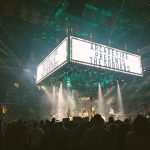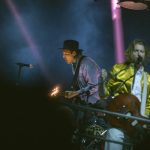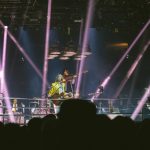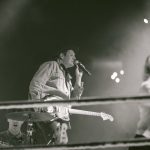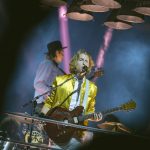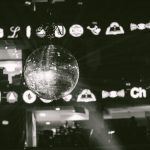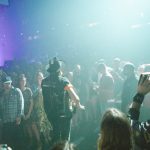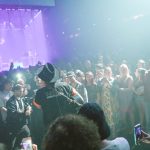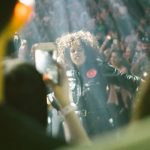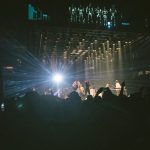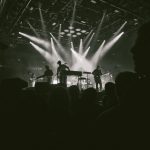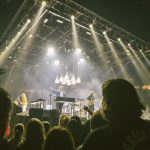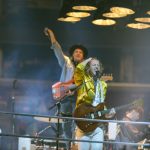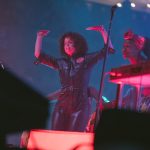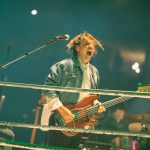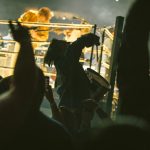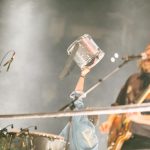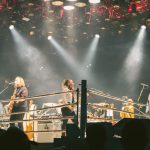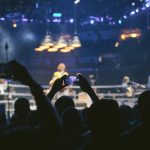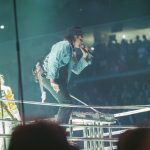
Arcade Fire | photo by Jeremy Zimmerman | jeremy-zim.com
In a sea of infinite content, Arcade Fire holds its own at Wells Fargo Center
I first got over Arcade Fire more than a decade ago. I guess you could say we peaked early. I was head over heels the first time I saw them, yelping and jumping, clattering countless tom-toms and swapping instruments with abandon. They were crammed onto the stage of a tiny club in Carrboro, NC, where I happened to be passing through on the night before Merge Records’ 15th anniversary festival. (I’d mostly stopped in to check out another new signee to the label, Lou Barlow. According to my blog, the night also included Win and Regine doing an impromptu rendition of The Magnetic Fields’ “Born On A Train,” as part of “Merge karaoke.”)
That show was a true, rare rock’n’roll thrill, one which even the mighty Funeral, when it finally arrived, couldn’t quite recapture (but I loved it anyway), and which had already begun to fade when I saw them again, in the First Unitarian basement, that fall. (It’s slightly hard to imagine, but I was significantly turned off by their lackluster cover of my all-time favorite song, Talking Heads’ “This Must Be The Place.”) That was the last time I saw them play live – that is, until this Sunday night, when they gave a decidedly (and yet, not entirely) different, undeniably thrilling performance at Wells Fargo Center as part of their “Infinite Content” tour.
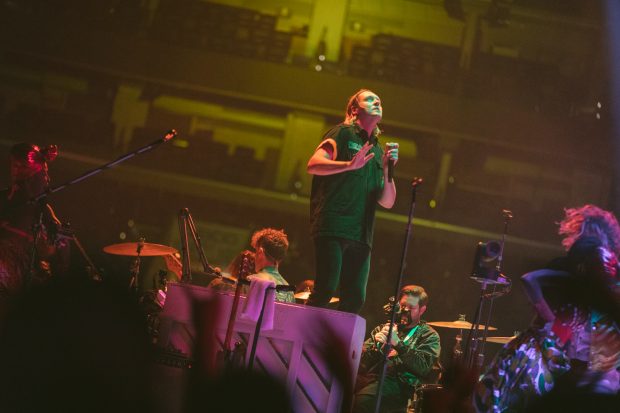
Arcade Fire | photo by Jeremy Zimmerman | jeremy-zim.com
In the wake of Funeral, I gradually came to regard the band like a courteous ex. By the time of their rather neutered-feeling second album – coming as my interest in indie-rock was waning across the board – they’d become, to me, just another band. Besides: they belonged to everybody else now; why did they need to be mine? So it’s been interesting to watch from the sidelines this year as – after a decade spent skillfully navigating the wave of their initial acclaim to success after (deserved) success – Arcade Fire have (finally?) come up against an honest-to-goodness critical backlash. Perhaps perversely, in the humanizing way of these things, it’s helped me feel more personally invested in them than I have in ages.
I can’t say I fully support, or even completely understand, the mixed reaction that’s accompanied their latest, fifth album cycle. But I get the gist, although it’s unclear (and probably dependent) what the balance is between annoyance at the band’s goofy and/or inane promotional stunts; kneejerk disdain for the new album’s unflinchingly catchy – yea, downright Abbaesque! – tunes (it figures that Arcade Fire fans would be the last bastion of hipster rockism) and aesthetic objection to its satirical visual rhetoric and accompanying “branding.” The critics do have a point, at least on that third count. The band’s heavily winking commentary on media saturation and unbridled commodification, topical as it may be, feels like a flimsy update/rehash of U2’s Popmart-era cartoon cynicism or, looking further back, David Byrne’s use of advertising and tabloid imagery circa True Stories. But Arcade Fire have never been all that convincing as an ideas band: their music is, on the whole, compelling despite and not because of their tendency to traffic in grand conceptual statements. Distressingly, the multimedia hoopla surrounding Everything Now often felt designed to distract attention away from the fact that it’s an actual album consisting of actual (perfectly enjoyable) songs – as opposed to faceless, interchangeable “content.” Which does a disservice to both the music and the ideas.
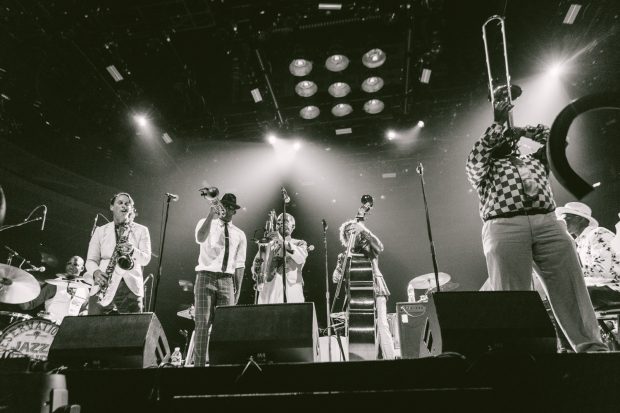
Preservation Hall Jazz Band | photo by Jeremy Zimmerman | jeremy-zim.com
Their concert on Sunday – delivered to a far-from-sold-out yet still enthusiastically receptive crowd – suffered initially from the same sort of misguided misdirection. A delightful opening set from the Preservation Hall Jazz Band (an odd pairing for a group with little overt connection to American roots music – particularly in this phase of their career – but nevertheless highly effective at establishing a joyous party atmosphere) was immediately thrown into bizarre relief by an avatar representing the grossest, clunkiest aspects of Everything Now’s conceptual baggage: a yee-hawing, galaxy-faced “space cowboy” who popped up on the jumbotron to “pump us up” for the show while hokily hawking tour merch. Similarly gimmicky, though a bit more genuinely fun, was the band’s arrival – to the strains of “A Fifth of Beethoven,” no less – in the guise of boxers entering the ring: undefeated; undisputed; weighing in, allegedly, at a collective 2100 pounds (seems dubious, even counting ten people on stage.) The potential metaphorical resonance abounded: you could read it in reference to entertainment as crass bloodsport; to boxing’s recent, hyper-commercialized Money Fight; to the Arcade Fire’s present predicament as a band embattled — their legit “undefeated” bona-fides notwithstanding.
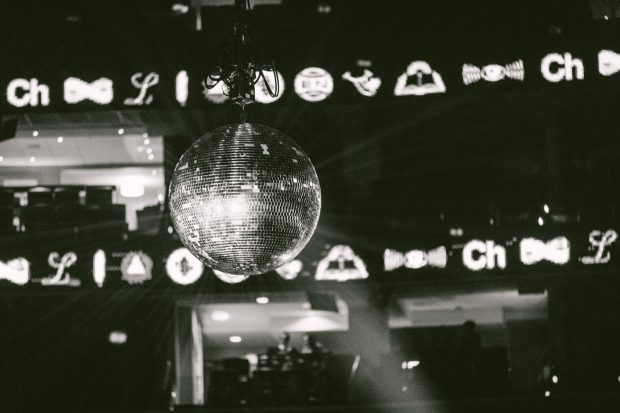
Arcade Fire Disco Ball | photo by Jeremy Zimmerman | jeremy-zim.com
But enough. By a few songs into the set, the metaphorical gloves (and the actual, shiny satin warm-up jackets) were off; the ropes lining all four sides of the “ring” – a square stage platform in the center of the arena – were taken down; and it became amply evident that what we were witnessing, though certainly a spectacle, was not a piece of performance art but, of course, a rock concert. And what a concert.
Honestly, the band never really seemed that interested in playing into any of the high-concept schtick. (To their credit – though also somewhat confusingly, as it creates the odd sense of it having been imposed from the outside …perhaps by the phantom, fictive “Everything Now” corporation.) Even with all that nonsense swirling around – not to mention the blaring, strobing lights and video screens seemingly legally-mandated for a modern arena show, which amped up the show’s energy even as they threatened to distract from its true energy source – it was impossible to miss the main event: those ten people on stage, in constant motion from one to another of its four “fronts;” onto or off of the central revolving turntable with its piano and two drumsets; swapping instruments; yelping and jumping and even, occasionally, beating on a banged-up old tom-tom or two.
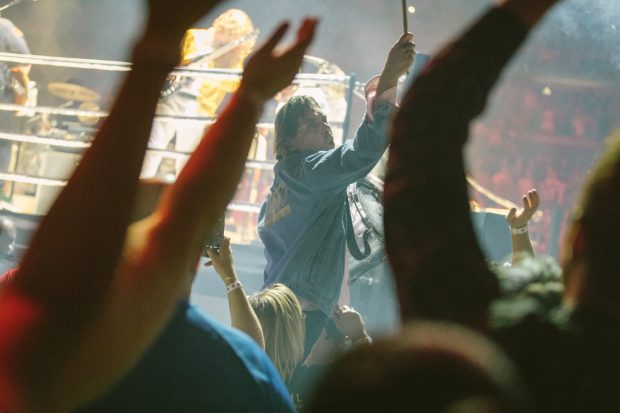
Arcade Fire | photo by Jeremy Zimmerman | jeremy-zim.com
So much of Arcade Fire’s appeal, I remember now, stems from their being a truly unified, multi-faceted collective band; with each member bringing their own character to augment the whole. Sure, Win – affable, lunkish, so earnest that even his grandstanding (“keep your heart open!”) feels endearingly humble – is ever a lovably unassuming frontman, with Regine his scampering, slightly inscrutable foil (and Richard Reed Perry is a source of endless entertainment.) But it’s just as much fun to watch Will energetically plink out just a couple of keyboard notes, or Sarah Neufeld’s effortless, fuss-free precision on the violin.
As for the actual “content” of the much-belabored “infinite content,” it was no less than a virtual greatest hits set. So many hits! At least two from each album: Neon Bible got the shortest shrift with just “No Cars Go” – dedicated to “anyone who saw us open for The Unicorns in 2003” – and the title lament (with Win pointedly reiterating “not much chance for survival…”); while The Suburbs got its own three-song mini-set, and fully half of Funeral was aired.
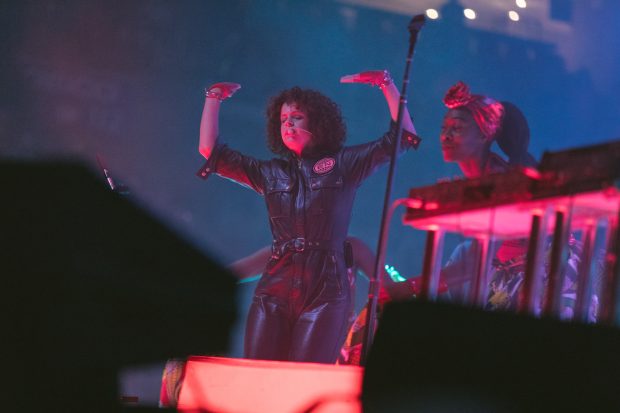
Arcade Fire | photo by Jeremy Zimmerman | jeremy-zim.com
And the new songs held their own impressively. “Everything Now” and “Signs of Life,” which kicked off the concert just as they do the album, practically feel like canon already. The leap from there to a slightly slowed-down “Rebellion (Lies),” even though it felt early in the set, was hardly a chasm, especially because the songs share the same basic disco beat – as did the several that followed, “Haïti” and Reflektor’s rara riot “Here Comes The Night Time.” “Infinite Content” (the band’s “Punk Love,” clearly) occasioned the night’s best video bit; an aptly goofy clip inspired by local TV news (“Breaking News: All Your Money Is Already Spent.”) That led not into its even jokier, country-styled twin, but rather into potent 1-2 main-set finale of the clinically Depeche’d “Creature Comfort” and a towering take on “The Power Out,” both accompanied by flashing red lights and cascading torrents of machine fog.
And “We Don’t Deserve Love,” the album’s lovely closer, which can stand proudly with any of their ballads, fit perfectly at the start of an encore that led ultimately, inexorably, to “Wake Up” – on which the Pres Hall Jazzers beefed up the band’s ranks (they really should have been up there all along) before spearheading a makeshift second-line parade winding its way around the crowd to the strains of “Stand By Me,” closing out the night.
- Arcade Fire | photo by Jeremy Zimmerman | jeremy-zim.com
- Preservation Hall Jazz Band | photo by Jeremy Zimmerman | jeremy-zim.com
- Preservation Hall Jazz Band | photo by Jeremy Zimmerman | jeremy-zim.com
- Preservation Hall Jazz Band | photo by Jeremy Zimmerman | jeremy-zim.com
- Preservation Hall Jazz Band | photo by Jeremy Zimmerman | jeremy-zim.com
- Preservation Hall Jazz Band | photo by Jeremy Zimmerman | jeremy-zim.com
- Preservation Hall Jazz Band | photo by Jeremy Zimmerman | jeremy-zim.com
- Preservation Hall Jazz Band | photo by Jeremy Zimmerman | jeremy-zim.com
- Preservation Hall Jazz Band | photo by Jeremy Zimmerman | jeremy-zim.com
- Preservation Hall Jazz Band | photo by Jeremy Zimmerman | jeremy-zim.com
- Preservation Hall Jazz Band | photo by Jeremy Zimmerman | jeremy-zim.com
- Preservation Hall Jazz Band | photo by Jeremy Zimmerman | jeremy-zim.com
- Preservation Hall Jazz Band | photo by Jeremy Zimmerman | jeremy-zim.com
- Preservation Hall Jazz Band | photo by Jeremy Zimmerman | jeremy-zim.com
- Preservation Hall Jazz Band | photo by Jeremy Zimmerman | jeremy-zim.com
- Preservation Hall Jazz Band | photo by Jeremy Zimmerman | jeremy-zim.com
- Preservation Hall Jazz Band | photo by Jeremy Zimmerman | jeremy-zim.com
- Arcade Fire | photo by Jeremy Zimmerman | jeremy-zim.com
- Arcade Fire | photo by Jeremy Zimmerman | jeremy-zim.com
- Arcade Fire | photo by Jeremy Zimmerman | jeremy-zim.com
- Arcade Fire | photo by Jeremy Zimmerman | jeremy-zim.com
- Arcade Fire | photo by Jeremy Zimmerman | jeremy-zim.com
- Arcade Fire | photo by Jeremy Zimmerman | jeremy-zim.com
- Arcade Fire | photo by Jeremy Zimmerman | jeremy-zim.com
- Arcade Fire | photo by Jeremy Zimmerman | jeremy-zim.com
- Arcade Fire | photo by Jeremy Zimmerman | jeremy-zim.com
- Arcade Fire | photo by Jeremy Zimmerman | jeremy-zim.com
- Arcade Fire Disco Ball | photo by Jeremy Zimmerman | jeremy-zim.com
- Arcade Fire | photo by Jeremy Zimmerman | jeremy-zim.com
- Arcade Fire | photo by Jeremy Zimmerman | jeremy-zim.com
- Arcade Fire | photo by Jeremy Zimmerman | jeremy-zim.com
- Arcade Fire | photo by Jeremy Zimmerman | jeremy-zim.com
- Arcade Fire | photo by Jeremy Zimmerman | jeremy-zim.com
- Arcade Fire | photo by Jeremy Zimmerman | jeremy-zim.com
- Arcade Fire | photo by Jeremy Zimmerman | jeremy-zim.com
- Arcade Fire | photo by Jeremy Zimmerman | jeremy-zim.com
- Arcade Fire | photo by Jeremy Zimmerman | jeremy-zim.com
- Arcade Fire | photo by Jeremy Zimmerman | jeremy-zim.com
- Arcade Fire | photo by Jeremy Zimmerman | jeremy-zim.com
- Arcade Fire | photo by Jeremy Zimmerman | jeremy-zim.com
- Arcade Fire | photo by Jeremy Zimmerman | jeremy-zim.com
- Arcade Fire | photo by Jeremy Zimmerman | jeremy-zim.com
- Arcade Fire | photo by Jeremy Zimmerman | jeremy-zim.com
- Arcade Fire | photo by Jeremy Zimmerman | jeremy-zim.com
- Arcade Fire | photo by Jeremy Zimmerman | jeremy-zim.com
- Arcade Fire | photo by Jeremy Zimmerman | jeremy-zim.com
- Arcade Fire | photo by Jeremy Zimmerman | jeremy-zim.com
Setlist
Everything Now
Signs of Life
Rebellion (Lies)
Here Comes the Night Time
Haïti
No Cars Go
Electric Blue
Put Your Money on Me
Neon Bible
Neighborhood #1 (Tunnels)
The Suburbs
The Suburbs (Continued)
Ready to Start
Sprawl II (Mountains Beyond Mountains)
Reflektor
Afterlife
Infinite Content
Creature Comfort
Neighborhood #3 (Power Out)
Encore:
We Don’t Deserve Love
Everything Now (Continued)
Wake Up
Stand By Me
